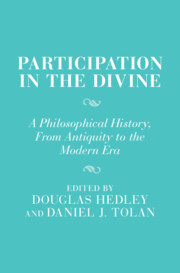Book contents
- Participation in the Divine
- Cambridge Studies in Religion and Platonism
- Participation in the Divine
- Copyright page
- Contents
- Contributors
- Foreword
- Acknowledgements
- Introduction
- 1 The Lord Is One
- 2 The Place and Scope of Participation in the Divine in the Thought of Plato
- 3 Origen on Participation
- 4 Forms, Intellects, and Angels
- 5 Participation in the Divine in Gregory of Nyssa
- 6 Augustine’s “Illumination” Theory as the Natural Participation of the Human Mind
- 7 The Principle of Cosmic Unification in the Athenian School of Platonism
- 8 St. Maximus the Confessor on Participation
- 9 Participation in Medieval Platonism
- 10 Participation as God’s Indwelling
- 11 Some Late Medieval Discussions of Participation in the Divine
- 12 Music, Temperance, and Participation in Marsilio Ficino
- 13 Richard Hooker’s Metaphysics of Divine Participation
- 14 The Transcendence of Holiness
- 15 Ralph Cudworth on Causality and Substantial Forms
- 16 The Romantic Legacy
- 17 Participation Revived and Revised
- Index
- References
5 - Participation in the Divine in Gregory of Nyssa
Published online by Cambridge University Press: 23 November 2024
- Participation in the Divine
- Cambridge Studies in Religion and Platonism
- Participation in the Divine
- Copyright page
- Contents
- Contributors
- Foreword
- Acknowledgements
- Introduction
- 1 The Lord Is One
- 2 The Place and Scope of Participation in the Divine in the Thought of Plato
- 3 Origen on Participation
- 4 Forms, Intellects, and Angels
- 5 Participation in the Divine in Gregory of Nyssa
- 6 Augustine’s “Illumination” Theory as the Natural Participation of the Human Mind
- 7 The Principle of Cosmic Unification in the Athenian School of Platonism
- 8 St. Maximus the Confessor on Participation
- 9 Participation in Medieval Platonism
- 10 Participation as God’s Indwelling
- 11 Some Late Medieval Discussions of Participation in the Divine
- 12 Music, Temperance, and Participation in Marsilio Ficino
- 13 Richard Hooker’s Metaphysics of Divine Participation
- 14 The Transcendence of Holiness
- 15 Ralph Cudworth on Causality and Substantial Forms
- 16 The Romantic Legacy
- 17 Participation Revived and Revised
- Index
- References
Summary
Gregory of Nyssa is the most philosophically minded of the Cappadocian Fathers and one of the most insightful interpreters of Origen.1 Harold Cherniss (1930–1971) considered Gregory a Platonist thinker thinly plated with Christianity; Jean Daniélou and others thought that Gregory progressively abandoned Platonism and/or Origen; I suspect that the latter option is not really the case (2018b), but Cherniss’s thesis is not tenable either. Von Balthasar (1942) and other scholars have seen Gregory as a great innovator with respect to Greek metaphysics.2 I have detected a consistency in his Christian Platonism3 – a consistency that has been denied: Gregory has been represented as confused and contradictory as a philosopher (e.g. Stead 1976); however, this position does not take into account that Gregory’s philosophical theology was not simply Platonism, but Christian Platonism,4 specifically Patristic Platonism, like that of Origen.5
- Type
- Chapter
- Information
- Participation in the DivineA Philosophical History, From Antiquity to the Modern Era, pp. 99 - 127Publisher: Cambridge University PressPrint publication year: 2024

